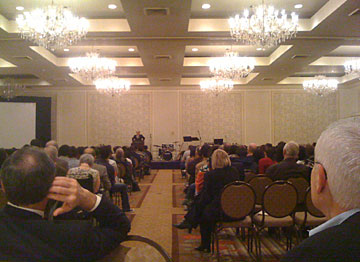|
Ivy League Congress. Discerning God's Call. Discerning God's Call to "Ministry." God's Guidance.
Ivy League Congress:
Discerning God's Call
by Rev. Dr. Mark D. Roberts
Copyright © 2008 by Mark D. Roberts
Note: You may download this resource at no cost, for personal use or for use in a Christian ministry, as long as you are not publishing it for sale. All I ask is that you give credit where credit is due. For all other uses, please contact me at mark@markdroberts.com. Thank you.
Ivy League Congress on Faith and Action
Part 1 of series: Ivy League Congress: Discerning God's Call
Permalink for this post / Permalink for this series
This past weekend I participated in the Ivy League Congress on Faith and Action, sponsored by the Christian Union. It happened at the Omni Hotel in New Haven, Connecticut, home of Yale University. Some 400 Ivy League students from all eight campuses gathered to be challenged and encouraged to live our their faith in the world. (The Ivy League consists of Brown, Columbia, Cornell, Dartmouth, Harvard, Penn, Princeton, and Yale.)
 The Christian Union assembled an impressive group of presenters, including: The Christian Union assembled an impressive group of presenters, including:
- The Baroness (Caroline) Cox, member of Britain's House of Lords
- Ken Costa, international banker and author of God at Work
- Richard Stearns, president of World Vision (Photo: Ken Costa speaking to the Congress; Richard Stearns is seated just to the right of me.)
- Steve Douglass, president of Campus Crusade
- Darrell Bock, author and professor at Dallas Theological Seminary
- Michael Lindsay, author of award-winning Faith in the Halls of Power
I was invited to participate on a panel to talk about professional ministry.
Many of my readers will not be familiar with the Christian Union since it is a relatively young ministry. Founded in 2002 by Matt Bennett, the Christian Union has the following mission:
The mission of the Christian Union, by God's power and with the help of other ministries, is to change the world by bringing sweeping spiritual transformation to the Ivy League Universities, thereby developing and mobilizing godly leaders to transform all sectors of society.
Whew! Now that's what I call a vision!
In particular, the Christian Union has established as a goal "to see 20% of students, faculty and staff involved with a Christian ministry by the year 2020." This goal responds to the sorry fact that only 3% to 8% of Ivy League students participate in any Christian ministry. The percentage for faculty is even lower.
Why focus on the Ivy League? Here the Christian Union has a pragmatic vision. It recognizes that graduates from these universities are disproportionately influential in the world. (Consider the fact that eight of nine Supreme Court Justices graduated from Ivy League Schools, as did George H.W. Bush, Bill Clinton, George W. Bush, Hillary Clinton, and Barack Obama. FYI: John McCain graduated from the Naval Academy.) If students of the Ivy League can be drawn to Christ and encouraged to live out their faith in action, this will have a major impact on the world, according to the Christian Union.
I have known about the Christian Union for some time, but this was my first direct experience of this ministry and its people. I was impressed by the quality of people involved with the Christian Union, their talents and commitment to Christ. Moreover, I was glad to see the breadth of their vision. Students were not being challenged to go only into "the ministry," i.e., full-time Christian service, but rather to live their lives in whatever realm or field as disciples of Christ.
The Christian Union also brings a refreshing willingness to team up with other ministries. Sometimes campus ministries (InterVarsity, Campus Crusdade, Navigators, etc.) can feel as if they're in competition with each other. And churches quite often feel as if they are in competition with the parachurch ministries. This sort of narrowness is nowhere to be found in the Christian Union. In fact, quite the opposite is true. They welcome partnerships with all sorts of like-minded Christian organizations.
As I mentioned above, I was involved in this Congress on Faith in Action as a member of a panel on "Ministry." Tomorrow I'll say a bit more about this panel and our presentation.
Ivy League Congress: "Seeds" of Discerning God's Call
Part 2 of series: Ivy League Congress: Discerning God's Call
Permalink for this post / Permalink for this series
 As I mentioned yesterday, this past weekend I participated in the Ivy League Congress on Faith and Action in New Haven, Connecticut – a short walk from Yale University. (Photo: Yale University from my hotel. In the immediate foreground is the New Haven Green, then the Old Campus. The prominent tower is Harkness Tower. As a Harvardarian, I hate to admit that I find the Yale campus quite attractive, reminiscent of Oxford University.) As I mentioned yesterday, this past weekend I participated in the Ivy League Congress on Faith and Action in New Haven, Connecticut – a short walk from Yale University. (Photo: Yale University from my hotel. In the immediate foreground is the New Haven Green, then the Old Campus. The prominent tower is Harkness Tower. As a Harvardarian, I hate to admit that I find the Yale campus quite attractive, reminiscent of Oxford University.)
The Ivy League Congress included many "Vocational Panels" in a variety of fields: Medicine, Law, Academy, Arts, Government, Business, Ministry, and Media. Speakers made it clear that God's call extends to any of these fields (and others). One can serve God as a "full-time minister" as a doctor, lawyer, banker, pastor, and so forth. This theology of ministry and discipleship is right on from a biblical point of view, and consistent with the vision of the ministry where I now serve. (See, for example, The High Calling of Our Daily Work website, sponsored by the Foundation that also supports Laity Lodge.)
I was teamed up on the "Ministry" panel with Steve Douglass, president of Campus Crusade, and Chuck Tompkins, coordinator of the John R. Mott Center at Cornell University (a part of the Christian Union's ministry). Each of us talked about our "calling" into "full-time ministry" in Christian organizations. Both Chuck and I had served as parish pastors for most of our lives. Steve, after graduating from Harvard Business School, went to work for Campus Crusade, where he has served for almost four decades.
Chuck kicked off the discussion with a fifteen-minute presentation on career and calling, urging us to distinguish between the two of them. Steve talked about his decision, after graduating high in in Harvard Business School class, to join Campus Crusade (much to the chagrin of his B-School profs). I sowed eleven "seeds" that help us to discern God's call upon our lives. My hope was that the students present, about 125 or so, might find one or more of these seeds to be relevant to their particular situation.
Today I'll begin to summarize my eleven "seeds of discernment." I'll finish up the list in the following days. I labeled each "seed" with a word, so that it might be easily identified and remembered.
Eleven Seeds for Discerning God's Call to "Ministry"
1. Laity
Yes, yes, I know this is the first name of my current ministry, Laity Lodge. But this word is essential if we're going to talk about God's call to ministry. Too often we use the language of calling and ministry only for what might be termed "full-time Christian service." (Even this phrase has problems, as I'll point out later.) In popular Christian paralance, once can be "called" to "ministry" if it's in the church, on the mission field, or in some sort of obviously Christian parachurch ministry. But this language is inconsistent with the biblical vision, in which all Christians are called into Christ's service. The laity (non-clergy) are just as much called by God as the clergy.
The fact that one can be called to ministry and not enter church or parachurch work is both freeing and potentially confusing. In one has a simple view of calling, in which only ordained ministers are called, then if one feels a call to go into ministry, the path is fairly clear and simple: Go to seminary and get ordained. But if one can be a minister in all avenues of life, as a banker or a teacher or a manager, then it may be more difficult to discern what sort of ministry God is calling one into.
Nevertheless, it's essential that any conversation about "ministry" as a career recognize that calling relates to a broad spectrum of options. In the apt phrase of Laity Lodge's founder, Howard E. Butt Jr., there is indeed a "high calling of our daily work."
So, then, if calling pertains to a wide range of options, how can one know if he or she is being called into parish ministry, or parachurch ministry, or missions? This leads to rest of the items on my list of "seeds" for discerning God's call.
2. Surprise
God's specific will is often surprising. He often leads us into avenues of service that we did not anticipate. Consider, for example, Moses's call to deliver Israel from Egypt, or David's call to be king, or Paul's call to be the apostle the Gentiles. This has been the story of my life:
- When I was a freshman in college, if you had told me that I'd go to grad school in New Testament, I'd have said you were crazy, because I thought I was supposed to be a lawyer.
- When I was in grad school, if you had told me that I was going to be a pastor, I'd have said you were crazy, becuase I thought I was supposed to be a professor.
- When I was an associate pastor at Hollywood Presbyterian Church, if you had told me I'd be a pastor in Orange County, California, I'd have said you were crazy because I didn't like Orange County, and I didn't want to pastor a suburban congregation, and I didn't want to go to a church that needed to build buildings.
- When I was a pastor at Irvine Presbyterian Church in Orange County, if you had told me I'd be working for a parachurch ministry in Texas, I'd have said you were truly out of your mind because I didn't want to leave parish ministry and I never, ever wanted to move my family to Texas.
- When, in the early 2000s, I was writing books and articles, if you had told me my greatest influence beyond my parish would be through blogging, I'd have said you were smoking illegal substances because I had no desire to become a blogger and no belief that anybody would ever bother to read my blog if, for some odd reason, I started one.
So, there you go. God has continually surprised me in my life, calling me to ministries that I never anticipated. I suppose one might say that I wouldn't be so surprised if I did a better job discerning God's will in the first place. I agree. But I think most of us, if we are open to the Lord, will find that he surprises us over and over again as he directs our lives and ministries.
Tomorrow I'll add more items to my list of "seeds" of discernment.
More Seeds for Discerning God's Call to Ministry
Part 3 of series: Ivy League Congress: Discerning God's Call
Permalink for this post / Permalink for this series
In my last post I sowed the first two of eleven "seeds" for discerning God's call to ministry:
1. Laity: All Christians have a high calling as ministers of Christ.
2. Surprise: It's likely that God will surprise you if you seek his will openly.
Today I'll scatter a few more seeds.
3. Sovereignty
If we wish to discern God's call upon our lives, we need to be committed to his sovereignty. In the words of Jesus, we are to seek first the kingdom of God. Everything else follows from this fundamental commitment.
Of course this is much easier said than done. As I write these words, I can honestly say that I desire God's will and that I am submitted to his sovereignty over my life. But then there's that part of me that really still wants my will and wants to run my own life. Thus I find myself needing to submit to God again and again. Submission is, after all, the flip side of sovereignty.
4. Stewardship
No, I'm not planning to take an offering. Stewardship means much more than it often signifies in church. It has to do with using well the gifts, talents, opportunities, relationships, and resources God has given me.
Throughout most of my adult life, I have been relatively sure that I was being a faithful steward of my life. But there have been times when I have wrestled for long periods of time with the stewardship issue. A few years ago, a seminary expressed significant interest in having me become their president. This position offered lots of opportunities for me. But, in the end, I just didn't believe that the duties of a seminary president were well suited to my personality and gifting. In 2007, the stewardship challenge reared its pesky head once again as Laity Lodge sought to have me join their team. This time, after five months of seeking God's will, I became convinced that I could best use the gifts God had given me in the context of Laity Lodge's ministries.
5. Blessing
 When we're wondering about God's call upon our lives, we ought to pay close attention to what he is already blessing. In John 5:19 Jesus said, "Very truly, I tell you, the Son can do nothing on his own, but only what he sees the Father doing; for whatever the Father does, the Son does likewise." Similarly, we ought to ask: What is God doing in my life? Where is God at work right now? (Photo: Phillips Brooks House at Harvard, where I did lots of teaching for the Christian fellowship there while I was a student at Harvard. When we're wondering about God's call upon our lives, we ought to pay close attention to what he is already blessing. In John 5:19 Jesus said, "Very truly, I tell you, the Son can do nothing on his own, but only what he sees the Father doing; for whatever the Father does, the Son does likewise." Similarly, we ought to ask: What is God doing in my life? Where is God at work right now? (Photo: Phillips Brooks House at Harvard, where I did lots of teaching for the Christian fellowship there while I was a student at Harvard.
One of the main reasons I became an ordained minister was that, even before I began the arduous process of becoming ordained in the Presbyterian Church USA, God was using me in ministries of teaching and leadership. I taught my first weekly Bible study when I was in high school, and had been consistently teaching in church and/or parachurch organizations ever since. The fact that God was blessing my ministry of teaching was strong evidence that he was leading me into a more focused calling as a teacher.
When people come to me, wondering if they are being called into ordained ministry, some of my very first questions are: What are you doing in ministry right now? Are you doing things that pastors do? Is God blessing these activities? If a person can answer "yes" to these questions, this is a positive sign. If not, then I encourage people to start doing pastor-like ministries and see what God does with them.
I'm just about half way through my list of "seeds" for discerning God's call to ministry. More later . . . .
Still More Seeds for Discerning God's Call to Ministry
Part 4 of series: Ivy League Congress: Discerning God's Call
Permalink for this post / Permalink for this series
In my last couple of posts I sowed the first five of eleven "seeds" for discerning God's call to ministry:
1. Laity: All Christians have a high calling as ministers of Christ.
2. Surprise: It's likely that God will surprise you if you seek his will openly.
3. Sovereignty: If we want to discern God's call upon our lives, we need to be committed to his sovereignty.
4. Stewardship: We should seek to use well the gifts, talents, and opportunities God has given to us.
5. Blessing: If we want to discern God's call for our future, we should attend to how he is blessing our lives and ministries right now.
Today I'll scatter a few additional seeds.
6. Community
We discern God's will for our lives in community. Though God may certainly reveal his plans to us in a private moment of prayer, even this must be weighed by brothers and sisters who know us well and who are seeking God along with us.
In 1990, when I first received the slightest hint that God may have been calling me away from Hollywood Presbyterian Church, I met with Ralph Osborne, a senior member of the staff there and one whose judgment I trusted. His observations were crucial to my process of discernment, as were those of my covenant group brothers.
Similarly, when I began wrestling with God's will for my life last year, wondering if I should move to Texas and join the Laity Lodge team, I had plenty of help from my covenant group, my spiritual director, and my wife. These folks helped me to see things I might surely have missed. In the end, their support was essential to my willingness to take a big leap of faith and come to Laity Lodge.
7. Fluidity
When we talk about God's call to ministry, sometimes we feel as if we are making a one-for-a-lifetime decision. This puts lots of pressure upon ourselves, and can inhibit us from boldly following God's lead. In fact, reality offers much more fluidity than we sometimes think. People these days are rarely deciding to do one thing for a lifetime, whether it's banking or pastoral ministry. Rather, there is a great deal of fluidity both within professions and among them. Therefore, it's not necessary for a 25-year-old to decide what he or she is going to do for a lifetime. The question is more: What does God have for me right now?
 One of the greatest examples of fluidity in ministry is that of Fred Rogers, better known as "Mr. Rogers" of "Mr. Rogers' Neighborhood." Though most of us think of Fred Rogers as a children's television personality, in fact he was also an ordained Presbyterian minister, whose work on television was approved as pastoral work. One can even be an ordained pastor and do something beyond serving in a local parish. One of the greatest examples of fluidity in ministry is that of Fred Rogers, better known as "Mr. Rogers" of "Mr. Rogers' Neighborhood." Though most of us think of Fred Rogers as a children's television personality, in fact he was also an ordained Presbyterian minister, whose work on television was approved as pastoral work. One can even be an ordained pastor and do something beyond serving in a local parish.
8. Family
People who are married, or who expect to be married, and even more those who also have children, accept an additional responsibility when it comes to discerning God's calling. 1 Corinthians 7 teaches that one who wants to serve the Lord will experience greater freedom and focus by remaining single. A married person, Paul explains, has divided interests. Notice that Paul does not criticize such a division. Implicitly, he acknowledges that the married person should indeed prioritize the needs of one's spouse. Thus the husband or wife is not in a place to ask simply: What does God want for me? Rather, the appropriate question is: What does God want for me and my family?
Last year, as I was puzzling over whether to come to Laity Lodge or not, I had a much harder time deciding what was best for my family that what was best for me personally. A good month before I said "yes" to Laity Lodge, I had determined that, if I were single, I was ready to move forward. But I was not single. As a husband and father, I'm responsible for the well-being of my wife and children. In particular, I needed to know that Laity Lodge would provide an optimum environment for my wife, Linda, to exercise her ministry gifts.
Three More Seeds for Discerning God's Call to Ministry
Part 5 of series: Ivy League Congress: Discerning God's Call
Permalink for this post / Permalink for this series
More Seeds for Discerning God's Call to "Ministry"
In my last several posts I sowed the first eight of eleven "seeds" for discerning God's call to ministry:
1. Laity: All Christians have a high calling as ministers of Christ.
2. Surprise: It's likely that God will surprise you if you seek his will openly.
3. Sovereignty: If we want to discern God's call upon our lives, we need to be committed to his sovereignty.
4. Stewardship: We should seek to use well the gifts, talents, and opportunities God has given to us.
5. Blessing: If we want to discern God's call for our future, we should attend to how he is blessing our lives and ministries right now.
6. Community: We discern God's call, not alone, but in community with other believers.
7. Fluidity: Fluidity within professional ministry positions means that we don't have to figure out our entire career before stepping out in faith.
8. Family: A person who is married and/or has children must take seriously what is best for his or her family in discerning God's call.
Today I'll finish up with the last three seeds.
9. Obedience
Simply put, if God is sovereign, then we ought to obey him. Specifically, this takes the form of obeying divine teaching in Scripture. For example, my professional journey from Irvine Presbyterian Church to Laity Lodge began with a passage of Scripture I was preaching on in February 2007:
"No one tears a piece from a new garment and sews it on an old garment; otherwise the new will be torn, and the piece from the new will not match the old. And no one puts new wine into old wineskins; otherwise the new wine will burst the skins and will be spilled, and the skins will be destroyed. But new wine must be put into fresh wineskins." (Luke 5:34-38)
Right around the time I preached on this text, a representative of Laity Lodge asked about my openness to join their staff. I told him that I was not especially interested in changing job and moving my family, but that I believed I needed to be open to God's new wineskins for my life. One thing led to another, and five months later I had decided to come to Laity Lodge. This process began with what felt like sheer obedience to God.
10. Redemption
 The Bible is filled with stories of redemption. Consider the case of Joseph, for example. Though he was sold into slavery by his brothers, and though he was falsely imprisoned in Egypt, God used these "misfortunes" to bring Joseph to a place of power and influence. (Photo: Donny Osmond as Joseph in Andrew Lloyd Webber's Joseph and the Amazing Technicolor Dreamcoat) The Bible is filled with stories of redemption. Consider the case of Joseph, for example. Though he was sold into slavery by his brothers, and though he was falsely imprisoned in Egypt, God used these "misfortunes" to bring Joseph to a place of power and influence. (Photo: Donny Osmond as Joseph in Andrew Lloyd Webber's Joseph and the Amazing Technicolor Dreamcoat)
The fact that God can redeem wrong actions, not to mention well-intended mistakes, should give us a sense of freedom when we're seeking to discern God's call to ministry. If we happen to "get it wrong," God is not up in heaven worrying about what to do next. Rather, in his sovereignty, wisdom, and grace, God can work all things together for good (Rom 8:28). This doesn't mean we shouldn't work hard to discern God's will. But it does mean that we can be set free from the fear of failure when discernment misses the mark.
11. Wholeheartedness
Wholeheartedness can be a sign of God's call to ministry. The heart, from biblical perspective, is not just the seat of emotion. Rather, it includes feeling, reason, and will. A wholehearted commitment to a particular ministry means I think it's the right thing for me to do, and that I am choosing to do it in faithfulness to God, and that I'm excited about doing it.
Of course there will be times in our Christian service when we won't feel very happy about what we're doing. Exhaustion, discouragement, criticism, and boredom can surely lessen our enjoyment of ministry. But we can remain wholehearted in our commitment when it is based on more than emotion. If I believe God has called me to serve him in a particular ministry, then I'll hang in there even when my emotions might lead me in other directions.
Nevertheless, it's right for a person to ask: What moves my heart when it comes to the Lord's work? What gets my pulse racing? What would I love to do for the Lord?
Conclusion
In scattering eleven "seeds" for discerning God's call to ministry, I haven't provided any foolproof formulas for discernment. As you might have guessed, I don't believe such formulas exist. God works uniquely with each person. Some are called through a dramatic encounter with God, like St. Paul on the road to Damascus. Others discern God's call only through a long process of waiting, thinking, and praying. But I believe that if we let the "seeds" of discernment take root, if we attend to them faithfully, God will indeed lead us in our quest to serve him with our lives.
|

